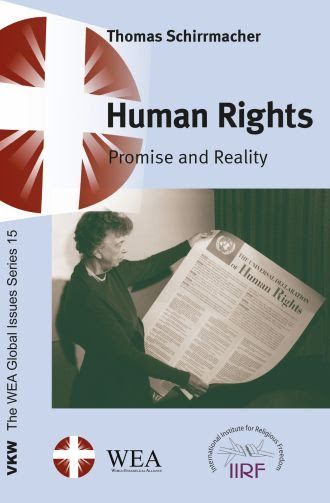|
(Bonn, 01.10.2015) Human rights: They should serve a unifying function, but instead they unleash intense discussion around the world. The World Evangelical Alliance’s Speaker for Human Rights, Thomas Schirrmacher, has written on the topic of human dignity and freedom in his new book Human Rights: Promise and Reality – and in the process he looks for their origin in Christianity.

All people are free and equal: In approximately 100 pages, Schirrmacher, who is also President of the International Council of the International Society for Human Rights, that the implementation of human rights often does not correspond to the intended ideal. Schirrmacher, a sociologist of religion, makes this clear in the first chapters of the book. There he expounds that human rights are more disputed than ever nowadays. What is missing is a common basis for human rights. Every nation brings along its own history, every state its own laws, and every problem its own tough aspects.
Alone the diversity of institutions demonstrates that the field of human rights is expansive. Indeed, there are organizations such as the European Council, the International Criminal Court, and the UN Security Council which advocate the safeguarding of human rights, although each has varying amounts of room to maneuver. This of course also affects how the issues are handled by each of these organizations. In spite of their goals and efforts, people are still robbed of their dignity and freedom, persecuted, oppressed, and exploited.
“A given for Christians!”
The book is part of the Global Issues Series put out by the Worldwide Evangelical Alliance and promises to be compact and yet provide well-grounded information with respect to the “grand idea of human rights.” Schirrmacher not only expounds on the individual institutions which currently concern themselves with human rights questions. He also goes into the origins of these rights. According to Schirrmacher, they are a product of European spiritual and religious history. “The existence of human rights is thus principally a Christian concept which is rooted in the towering dignity of each individual person as an image of the Creator.” According to Schirrmacher, in the modern understanding of human rights, what has emerged is a situation where there has been a secularization of Christian notions, a mixture of Calvinism and the Enlightenment.
The author writes that for most Christians nowadays, human rights are a matter of course. In his view, “People, indeed all people and not only Christians, are God’s creations and images of God and for that reason possess an incredible dignity which precedes all other things.” This dignity is independent of whether a person is a Christian or not, according to Schirrmacher. From a Christian point of view, the justification of human rights is located as early as in the creation story: This is due to the fact that all people are equal before God. In the same way, the state should administer justice independently of a person’s individual standing.
Human rights and Islam
Schirrmacher not only turns his attention to Christianity in his book. Islam is also a part of his deliberations. In Schirrmacher’s opinion, this is the sole religion which has a difficult time with human rights “for everyone,” for instance for women and for non-believers. Indeed, the Cairo Declaration on Human Rights in Islam, which was signed by the 57 states within the Organization of the Islamic Conference, speaks out in favor of their observance. And yet, from Schirrmacher’s point of view, they do not hold to this in practice. Schirrmacher holds that human rights are measured against the Sharia. The author has determined the following: “This has little to do with Islam as a religion and more to do with the balance of power which has developed.” According to Schirrmacher, the majority of Islamic states find themselves ruled by dictators or by autocrats who are elected for life.
Schirrmacher writes that in Judaism and in Christianity “the entire perspective with regard to the earthly world is a perspective comprised of legal structures.” The state is a constitutional state, and the political order a legal order. “What liberal Protestantism at one time derided or criticized because it desired a form of Christianity free from all laws has long since become the structure of our everyday life: Collective life is held together by laws and statutes.”
For that reason, Schirrmacher clings to the following: “‘Human rights are eternal, unalterable, and universal.” One is left wanting to chime in with an ‘amen,’ completely in the spirit of religious language.”
Downloads and Links:
|
Stay Connected